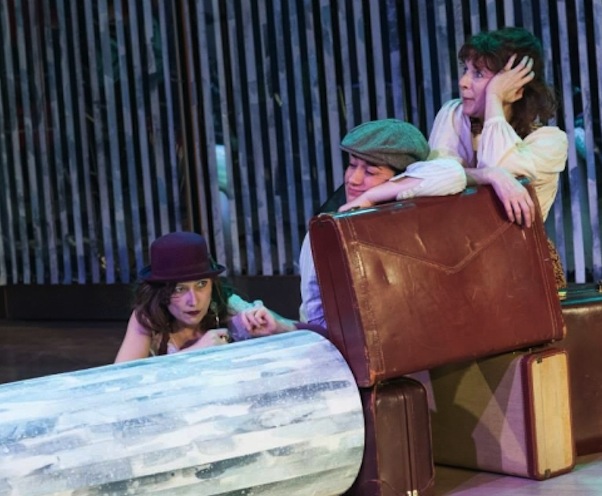Theater Review: A Lively, Gender Bender of an “As You Like It”
Were there no men available for the roles of Touchstone and Jaques, or was the intention to showcase more of the gifted women who are members of the ASP troupe?
As You Like It by William Shakespeare. Directed by Robert Walsh. Staged by Actors’ Shakespeare Project at The Springstep Building, Medford, MA, through May 18.

Mara Sidmore as Celia, Brooke Hardman as Rosalind, and Paula Plum as Touchstone in Actors’ Shakespeare Project’s production of “As You Like It.” Photo: Stratton McCrady Photography.
By Iris Fanger
What happens when the cultural pervasiveness of political correctness meets the current theater’s yen in trying just about anything?
One answer is the Actors’ Shakespeare Project’s lively production of As You Like It. Robert Walsh has created a playfully expansive vision of the Forest of Arden, a pictorial approach well served by scenic designer Grace Laubacher, who has conjured up a setting from mirrored panels and strips of shiny, silver paper descending in columns from ceiling to floor, where they morph into tree roots. Walsh moves the cast members around this flexible, quasi-abstract space: they furtively meet in glens for intimate conversations, or wander in a wide sylvan wilderness far from the corrupt civilization they left behind.
However, by choosing two strong women to play the roles of major male characters, Walsh has transformed one of Shakespeare’s most winning comedies — albeit with its dark sides — into a standard feminist tract. There’s no quibbling about the talents of Paula Plum and Jennie Israel, but the casting skews the play in weird directions: it is no longer a playful treatise on the vagaries of romance, but a curious look at a society where the women take eccentric prominence. Plum as Touchstone the clown appears in Groucho Marx style, complete with bowler hat, black-rimmed glasses, the ubiquitous cigar, and arms and legs that seem to be exploding out from her body. When she arrives in the Forest of Arden, she does a mirror-reverse of Rosalind’s actions, throwing off her men’s clothes to reveal that she is really a woman, and on the make for a hunk of a shepherd guy. Huh?
Israel who has previously appeared on local stages as the domineering Medea and the tortured Lady Macbeth, turns Jaques into an hyper sensuous presence on stage. The character’s melancholy seems to serve as an emotional sink hole between boredom and hot flashes. Shakespeare wrote his plays for a troupe of men playing women, so when Rosalind becomes the youth Ganymeade in order to make her escape into the forest, there are added twists on gender at work. Multiplying the gimmick by having a man become a woman and then turn into a man complicates the illusion, but not necessarily in ways that suit the material. What is the director’s reason for expanding on the original theatrical trickery? Were there no men available for the roles, or was the intention to showcase the gifted women who are members of the ASP troupe?
Otherwise, the ensemble takes on the play with few stumbles in the assignments for doubling and tripling in the smaller roles. Walsh is a noted fight director, so the violence of the wrestling scenes is treated with relish. Orlando, portrayed by an appealing Jesse Hinson, shows a nimble gift for comedy, in contrast to the poignancy of his performance in the recent production of The Whipping Man at New Rep, he gives as good as he gets in both his encounters, first erupting in anger at his conniving brother, Oliver, played by the well-spoken Johnnie McQuarley, followed quickly by his brutal smack-down of Charles the Wrestler (Steven DeMarco) who literally almost knocks Orlando dead before the hero makes a desperate come-back.
Walsh has hopped up the relationship between Rosalind, played by the winsome Brooke Hardman, and her loyal cousin, Celia, the diminutive, wide-eyed Mara Sidmore. They come off as a pair of emotionally-dependent, giggly teeny-boppers. In the forest scenes, Hinson is nearly drunk with love, but later he telegraphs to the audience that he’s caught on to the joke of his adored’s identity. This makes Orlando less of a dolt than usual. Richard Snee, double cast (and more), is an affecting ancient Adam, emptying his savings and following Orlando into the forest, creaky bones be damned. Later Snee becomes the wise shepherd Corin, a stabilizing influence. The sweet young actor Katie Elinoff plays the petulant Phebe and a variety of other roles (including singing the Shakespearean poems set to music by David Reiffel); she holds her own against the more experienced actors on stage. Joel Colodner, as both the duplicitous Duke Frederick and the usurped brother, Duke Senior, projects a powerful image of evil vs. good, a la Jekyll and Hyde.
To the credit of the ensemble, its delivery of Shakespeare’s lines was so clear that the play was accessible and entertaining to an audience of high school students who attended the same 10 a.m. performance that I did last week. In particular, the adolescents seemed to appreciate the up-dated gags; I suspect a day out of school with a play by the Bard proved to be more fun than expected.
Iris Fanger is a theater and dance critic based in Boston. She has written reviews and feature articles for the Boston Herald, Boston Phoenix, Christian Science Monitor, New York Times, and Patriot Ledger as well as for Dance Magazine and Dancing Times (London).
Former director of the Harvard Summer Dance Center, 1977-1995, she has taught at Lesley Graduate School and Tufts University, as well as Harvard and M.I.T. She received the 2005 Dance Champion Award from the Boston Dance Alliance and in 2008, the Outstanding Career Achievement Award from the Graduate School of Arts and Sciences at Tufts. She lectures widely on dance and theater history.
